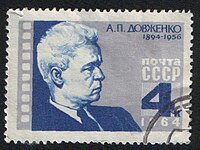Alexander Dovzhenko
- Birth Date:
- 29.08.1894
- Death date:
- 25.11.1956
- Length of life:
- 62
- Days since birth:
- 47356
- Years since birth:
- 129
- Days since death:
- 24621
- Years since death:
- 67
- Person's maiden name:
- Alexander Petrovich Dovzhenko
- Extra names:
- Oleksandr Dowschenko, Александр Довженко, Алекса́ндр Петро́вич Довже́нко; Aleksandrs Dovženko, Олександр Петрович Довженко, Oleksandr Petrowytsch Dowschenko
- Categories:
- Director, Film director, WWII participant
- Cemetery:
- Novodevichy Cemetery
Alexander Petrovich Dovzhenko (Ukrainian: Олександр Петрович Довженко, Oleksandr Petrovych Dovzhenko; Russian: Алекса́ндр Петро́вич Довже́нко, Aleksandr Petrovich Dovzhenko; September 10 [O.S. August 29] 1894 – November 25, 1956), was a Soviet screenwriter, film producer and director of Ukrainian origin. He is often cited as one of the most important early Soviet filmmakers, alongside Sergei Eisenstein and Vsevolod Pudovkin, as well as being a pioneer of Soviet montage theory.
 Aleksandr Dovzhenko on a Soviet post stamp
Aleksandr Dovzhenko on a Soviet post stamp
Biography
Alexander Dovzhenko was born in the district of Viunyshche in Sosnytsia, a townlet located in the Russian Empire (now in the Chernihiv Oblast in Ukraine), to Petro Semenovych Dovzhenko and Odarka Ermolaivna Dovzhenko. His paternal ancestors were Cossacks who settled in Sosnytsia in the eighteenth century, coming from the neighbouring province of Poltava. Alexandr was the seventh of fourteen children, but due to the horrific rate of child loss he became the oldest child by the time he turned eleven (only Alexandr and his sister Polina survived).
Although his parents were uneducated, Dovzhenko's semi-literate grandfather encouraged him to study, leading him to become a teacher at the age of 19. He escaped military service during both World War I and the Russian Revolution because of a heart condition, but did join the Communist Party in the early 1920s. He even served as an assistant to the Ambassador in Warsaw as well as Berlin. Upon his return to USSR in 1923, he began illustrating books and drawing cartoons in Kharkiv.
Dovzhenko turned to film in 1926 when he landed in Odessa. His ambitious drive led to the production of his second-ever screenplay, Vasya the Reformer (which he also co-directed). He gained greater success with Zvenyhora in 1928 which established him as a major filmmaker of his era. His following "Ukraine Trilogy" (Zvenigora, Arsenal, and Earth), although underappreciated by some contemporary Soviet critics (who found some of its realism counter-revolutionary), is his most well-known work in the West. For his film Shchors, Dovzhenko was awarded the Stalin Prize (1941); eight years later, in 1949, he was awarded another Stalin Prize for his film Michurin.
Dovzhenko served as a wartime journalist for the Red Army during World War II. After spending several years writing, co-writing and producing films at Mosfilm Studios in Moscow, he turned to writing novels. Over a 20 year career, Dovzhenko personally directed only 7 films.
He was a mentor to the young Soviet filmmakers Larisa Shepitko and Serhiy Paradzhanov. Dovzhenko died of a heart attack on November 25, 1956 in his dacha in Peredelkino. His wife, Yulia Solntseva continued his legacy by producing films of her own and completing projects Dovzhenko was not able to create.
The Dovzhenko Film Studios in Kiev were named after him in his honour following his death.

Dovzhenko's grave in Novodevichy Cemetery
Filmography
- Love's Berries (Russian: Ягoдки Любви, translit. Yagodki lyubvi, Ukrainian: Ягідки кохання, translit. Yahidky kokhannya), 1926
- Vasya the Reformer (Russian: Вася - реформатор, translit. Vasya - reformator, Ukrainian: Вася - реформатор, translit. Vasya - reformator), 1926
- The Diplomatic Pouch (Russian: Сумка дипкурьера, translit. Sumka dipkuryera, Ukrainian: Сумка дипкур'єра, translit. Sumka dypkuryera), 1927
- Zvenigora (Russian: Звенигора, translit. Zvenigora, Ukrainian: Звенигора, translit. Zvenyhora), 1928
- Arsenal (Russian: Арсенал, Ukrainian: Арсенал), 1928
- Earth (Russian: Зeмля, translit. Zemlya, Ukrainian: Зeмля, translit. Zemlya), 1930
- Ivan (Russian: Ивaн, Ukrainian: Iвaн), 1932
- Aerograd (Aerohrad, Russian: Аэроград, Ukrainian: Аероград, translit.), 1935
- Bukovyna: a Ukrainian Land (Russian: Буковина, земля Украинская, translit. Bukovina, Zemlya Ukrainskaya, Ukrainian: Буковина, зeмля Українськa, translit., Bukovyna, Zemlya Ukrayins'ka), 1939
- Shchors* (Russian: Щopc, Ukrainian: Щopc), 1939
- Liberation* (Russian: Освобождение, translit. Osvobozhdeniye, Ukrainian: Визволення, translit. Vyzvolennya), 1940
- Battle for Soviet Ukraine* (Russian: Битва за нашу Советскую Украину, translit. Bitva za nashu Sovetskuyu Ukrainu, Ukrainian: Битва за нашу Радянську Україну, translit. Bytva za nashu Radyans'ku Ukrayinu), 1943
- Soviet Earth (Russian: Cтpaнa poднaя, translit. Strana rodnaya, Ukrainian: Країна pідна, translit. Krayina ridna), 1945
- Victory in the Ukraine and the Expulsion of the Germans from the Boundaries of the Ukrainian Soviet Earth (Russian: Победа на Правобережной Украине и изгнание немецких захватчиков за пределы украинских советских земель, translit. Pobeda na Pravoberezhnoi Ukraine i izgnaniye nemetsikh zakhvatchikov za predeli Ukrainskikh sovietskikh zemel, Ukrainian: Перемога на Правобережній Україні, translit. Peremoha na Pravoberezhniy Ukrayini), 1945
- Michurin (Russian: Мичурин, Ukrainian: Мічурін), 1948
- Farewell, America (Russian: Прощай, Америкa, Ukrainian: Прощай, Америко, translit. Proshchay, Ameryko), 1949
- Poem of the Sea* (Russian: Поэма о море, translit. Poema o more, Ukrainian: Поема про море, translit. Poema pro more), 1959
***
Source: wikipedia.org, google.ru
No places

Relations
| Relation name | Relation type | Description | ||
|---|---|---|---|---|
| 1 |  | Сергей Столяров | Coworker | |
| 2 |  | Валентин Ежов | Student |
No events set



